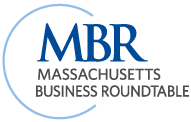Roundtable Members Share Employer Priorities and Reflect on Outlook for 2022
How are Massachusetts employers approaching plans for 2022? This December, the Massachusetts Business Roundtable hosted its quarterly Board of Directors meeting as well as an Open Forum which included two opportunities for members to discuss the top issues employers are currently facing and expect to continue to manage in 2022. Addressing the COVID-19 pandemic response continues to be top-of-mind for employers including public health policies, return to office plans, and attracting and retaining talent. As we embark on 2022 here are a few takeaways based on feedback from members on priorities, how they are responding to current challenges, and their outlook for the next year.
1. The economic outlook is dominated by permanent changes to the labor market
Attracting and retaining talent was a consistent challenge for member companies throughout 2021, and economic forecasts indicate this challenge will persist. During the December Board meeting, a guest economist from EY-Parthenon commented that while the economy may stabilize and grow in 2022, there is a long-term impact on the labor market with fewer workers seeking jobs due to several factors, including the public health crisis, inadequate access to childcare, and changing demographics. Moreover, as members manage a mix of economic factors such as supply chain disruption and accelerated automation and digitization, the labor shortage dominates their economic outlook into the new year; surveyed during the December Board meeting, 87% of responding members reported that the economy is good and they plan to hire, and another 8% reported plans to hire despite economy not being good for their business. Hiring and retaining talent will continue to be top priorities for Roundtable members next year.
2. As the workplace is redefined, employers are adapting their talent recruitment, development, and retention strategies accordingly
Throughout 2021, the Roundtable surveyed members to track how they are implementing return to office plans and redefining their workplaces. As of December 2021, 67% of responding members are operating in a hybrid work environment, and another 10% are all or mostly remote, a drastic change from pre-pandemic work arrangements. When asked about the biggest factors impacting employees’ willingness to return to the office, the top responses were preference for remote work (79%) and status of COVID-19 (54%), followed by caregiving responsibilities (46%), commuting issues (41%), unvaccinated young children at home (26%), or other (18%). Employers recognize that these preferences and challenges will continue in 2022 and beyond, and many have adopted permanent hybrid work models or increased flexibility, while also focusing on other ways to support employees, such as prioritizing retention strategies, investing in diversity, equity, and inclusion in hiring, and increasing communication and access to leadership. Members also shared their observation of a cultural shift and how they have recalibrated their expectations for how the office is used, with one member using the phrase, “coming in for the moments that matter.”
We also heard from members that long-term planning for the Commonwealth’s workforce is an opportunity for employers to think differently about their hiring strategies, and members discussed how employers can increase their partnership with Massachusetts’ rich ecosystem of higher education and training providers to increase job training, apprenticeships, and career pathways. The Roundtable works with many groups including the Workforce Solutions Group, the Alliance for Vocational Technical Education, Massachusetts Workforce Association, and the Massachusetts Business Coalition on Skills to promote career pathways, and we will continue to work with our members to increase collaboration between employers and education and training providers.
3. Advancements in public policy for mental health, childcare, and caregiving will be critical in supporting Commonwealth’s current and future talent
As Roundtable members discussed the intersection of the COVID-19 pandemic and workforce challenges, members consistently raised concerns to support the mental health of employees. Members recognize their employees need a new set of work supports as a result of the pandemic, and have also recognized the current mental health crisis will have a long-term impact on today’s young adults (Massachusetts’ future talent), whose mental health has been disproportionately affected by the pandemic. The Roundtable supports a provision in pending state legislation to requiring coverage of annual mental health exams, and continues to explore how employers can support mental health. Similarly, many Roundtable members are involved with the Massachusetts Caregivers Coalition and the Massachusetts Business Coalition for Early Childhood Education, recognizing caregiving and childcare as critical infrastructure for many employees in the workforce and jobseekers in the labor market.
Looking ahead to 2022, it is clear that public health and economic challenges linked to the pandemic will continue to impact how Roundtable members structure their work arrangements, talent strategies, and public policy priorities, and that employers will continue to view talent and pandemic response as interconnected priorities.
RECENT POSTS
- No Borders: Climate Change, A Call to Action for All
- Celebrating Diversity
- A Talent Agenda to Drive Massachusetts Competitiveness
- Taking Aim at the State’s Competitiveness
- Bentley and Roundtable Gather Executives To Discuss How Business Impacts Society
- Quarterly Policy Roundup: Q2 2024
- What We Learned on Our Trip to D.C.
- Conversations with Business Leaders: Navigating the Challenges Impacting Growth in Massachusetts
- Quarterly Policy Roundup: Q1 2024
- Black History Month: Reflections from Roundtable Staff
